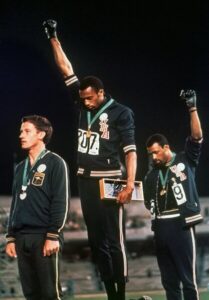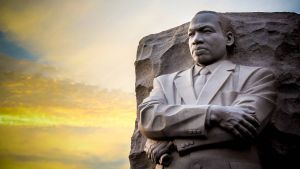
During a medal ceremony in the 1968 Mexico Olympics, sprinters Tommie Smith and John Carlos bowed their heads and raised their black-gloved fists to the sky as a symbol of the struggle for racial equality in the U.S. Besides making history, the pair also created one of the most iconic civil rights images of all time.
And now, the United States Olympic and Paralympic Committee (USOPC) has announced they are open to similar calls for social justice and reform during the 2021 U.S. trials for the Summer Olympics in Tokyo.
Usually conservative and unwilling to let athletes make political statements of any type, the group this year surprised many by saying that it “will not sanction athletes who kneel for the national anthem at the Olympic trials in support of social or racial justice movements.”
Lauren M. Johnson of CNN has reported that the committee recently released revised guidelines and provided examples of what is and isn’t allowed during this year’s games. Approved actions include “raising a fist at the start line or podium, kneeling for the national anthem at the start line or podium and wearing clothing that has social justice language such as ‘Black Lives Matter.’”
“Athletes may also advocate vocally for their causes,” Johnson added, noting that actions not permitted during the Olympic trials include “defacing an American flag or engaging in racist or hate speech.”
In a statement, Sarah Hirshland, CEO of the USOPC, commended the work of the group’s Council on Racial and Social Justice, saying the group had “made it clear there is a deep desire for Team USA athletes to speak on these issues, and to lead as a positive force in our community.”
Hirshland also promised that her committee will “create opportunities through Team USA to promote athletes who do speak out and provide education through a town hall to create dialogue.”
“While we support your right to demonstrate peacefully in support of racial and social justice, we can’t control the actions others may take in response,” she said. “I have confidence you’ll make the best decision for you, your sport and your fellow competitors.”
While social protests will be allowed during Olympic qualifications, it’s not yet known what officials in Tokyo will and will not permit during the actual games in July. Whatever they decide, it will likely be very different than the uproar that occurred in 1968 following the actions of Smith and Carlos.
According to Johnson, “the entire Olympic organization, including the U.S. Olympic Committee, condemned [their] podium actions 53 years ago. The runners and their families were kicked out of the Olympics, suspended by their sport’s national governing body and received hate mail, death threats and continued criticism for their actions.”
Related: For more recent diversity and inclusion news, click here.


















